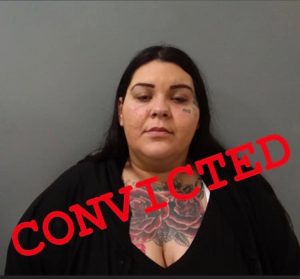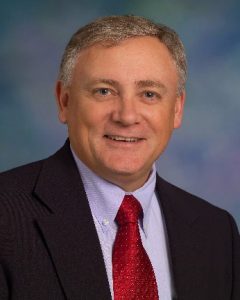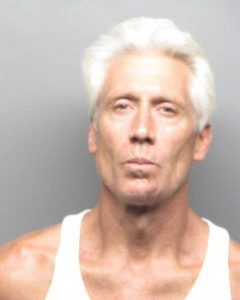 By Jimmy Lee, Director of Public Affairs, Contra Costa County Office of the Sheriff
By Jimmy Lee, Director of Public Affairs, Contra Costa County Office of the Sheriff
On Thursday, July 18, 2019, at about 9:09 PM, Muir Station Deputy Sheriffs were dispatched to a suspicious circumstance in the area of Riverside Drive and Mariners Cove in Bay Point. The caller stated that there was a man who appeared to be beaten in the street.
Deputies arrived and found an unresponsive man in front of a home on the 200 block of Riverside Drive. The victim was taken to a local hospital where he was later pronounced deceased. He is identified as 38-year-old Johnny Burns of Bay Point.
At about 9:21 PM, Deputy Sheriffs responded to a report of an assault with a deadly weapon on the 2700 block of Willow Pass Road in Bay Point. The victim was later treated and released from a local hospital.
The suspect vehicle and suspect descriptions were broadcast to law enforcement agencies in the area. The Concord Police Department later located the vehicle. Deputies responded to that location and took custody of 20-year-old Abel Garcia of Antioch. An arrest warrant was issued for the second suspect, Erick Ruiz. The 24-year-old Bay Point resident was arrested Friday, July 19, 2019.
Garcia was later booked into the Martinez Detention Facility (MDF) on the following charges: assault with a deadly weapon, felony battery, conspiracy and participating in acriminal street gang. Garcia is being held in lieu of $140,000 bail. Ruiz was also booked into the MDF for assault with a deadly weapon, felony battery and conspiracy. He is being held in lieu of $160,000 bail.
Detectives are still investigating both incidents to determine if they are linked.
The investigation is ongoing. Anyone with any information on this case is asked to contact the Office of the Sheriff at (925) 646-2441 or Investigation Division at (925) 313-2600. For any tips, email: tips@so.cccounty.us or call (866) 846-3592 to leave an anonymous voice message.
Read More
By Richmond Police Department
On 07-18-2019, 33-year-old Nicole Marie Hernandez was convicted of pimping two women and sentenced to three years in State Prison. The victims were originally intercepted by the Richmond Police while loitering for prostitution in the 23rd Street Corridor on March 21. Hernandez had rented them a room at the nearby Civic Center Motel. Forensic analysis of the victims’ cell phones revealed that the two were working as prostitutes for Hernandez. One of the victims even referred to Hernandez as “boss lady” in evidence recovered from her cell phone.
Human Trafficking Unit Supervisor Dana Filkowski prosecuted the case for the Contra Costa County District Attorney’s Office. She emphasized that “just as pimping and pandering crimes don’t respect jurisdictional boundaries, they also don’t respect gender boundaries. Women can be pimps just like men and they will be prosecuted and held accountable just like men.”
If you or someone you know is being pressured or encouraged to engage in prostitution to benefit or help support another person, help is only a phone call away. Contact Community Violence Solutions at 800-670-7273to speak to a confidential counselor. Or visit the Contra Costa Family Justice Centers in Richmond, Concord or Antioch to talk to a Navigator about a variety of services and support available right here in Contra Costa County. The Family Justice Centers are a family-friendly one-stop center serving victims of human trafficking, domestic violence and other types of interpersonal violence. No appointment is needed and the centers are located at 256 24th Street in Richmond, 2151 Salvio St., Ste. 201 in Concord or 3501 Lone Tree Way in Antioch.
To learn more about human trafficking in Contra Costa County, visit the Contra Costa Human Trafficking Coalition’s webpage at www.contracostacoalition.org.
Read More By Mass Communication Specialist 2nd Class Brian T. Glunt, Navy Office of Community Outreach
By Mass Communication Specialist 2nd Class Brian T. Glunt, Navy Office of Community Outreach
MILLINGTON, TN — A 2011 Monte Vista High School and 2015 University of Colorado at Boulder graduate and Danville, California, native participated in Sea Breeze 2019, a multinational maritime exercise in the Black Sea, July 1-12.
Lt. Adam Sharma, a U.S. Navy explosive ordnance disposal officer assigned to Explosive Ordnance Disposal Mobile Unit 8, took part in the exercise which focused on multiple warfare areas including maritime interdiction operations, air defense, anti-submarine warfare, damage control, search and rescue and amphibious operations.
“We rely heavily on our men and women in uniform to remain ready and vigilant in an increasingly complex environment, while they work closely with our NATO allies and partners to ensure regional stability,” said Vice Adm. Lisa M. Franchetti, commander, U.S. 6th Fleet. “Each and every sailor and Marine who is here in Ukraine participating in exercise Sea Breeze 2019 is absolutely essential to the success of this exercise, and we could not be more proud of their hard work and commitment.”
As an explosive ordnance disposal officer, Sharma is responsible for diffusing improvised explosive devices and other ordnance.
 This was the 19th iteration of Sea Breeze in which naval forces from 19 nations contributed in the annual exercise co-hosted by the Ukrainian and U.S. Navies aiming to improve interoperability while promoting regional security and peace.
This was the 19th iteration of Sea Breeze in which naval forces from 19 nations contributed in the annual exercise co-hosted by the Ukrainian and U.S. Navies aiming to improve interoperability while promoting regional security and peace.
Nations scheduled to participate in Sea Breeze include Bulgaria, Canada, Denmark, Estonia, France, Georgia, Greece, Italy, Latvia, Lithuania, Moldova, Norway, Poland, Romania, Sweden, Turkey, Ukraine, the United Kingdom and the United States.
“This year we will focus on strengthening our partnerships and building upon the friendships that have been established for years,” said Capt. Matthew Lehmann, commodore of U.S. Destroyer Squadron 60.
U.S. participation included the Arleigh Burke-class guided-missile destroyer USS Carney, a P-8A Poseidon from Patrol Squadron NINE, Navy Underwater Construction Team-1B, U.S. Marines from Marine Rotational Force-Europe and members of the Commander, Naval Forces Europe/Africa and Commander, U.S. Naval 6th Fleet staffs. In total, approximately 600 U.S. sailors and Marines participated.
“The thing I look forward to most during Sea Breeze is training with the Ukrainian explosive ordnance disposal divers,” said Sharma. “I enjoy everything about being in the Navy.”
To view a video of the exercise, click here.
Read More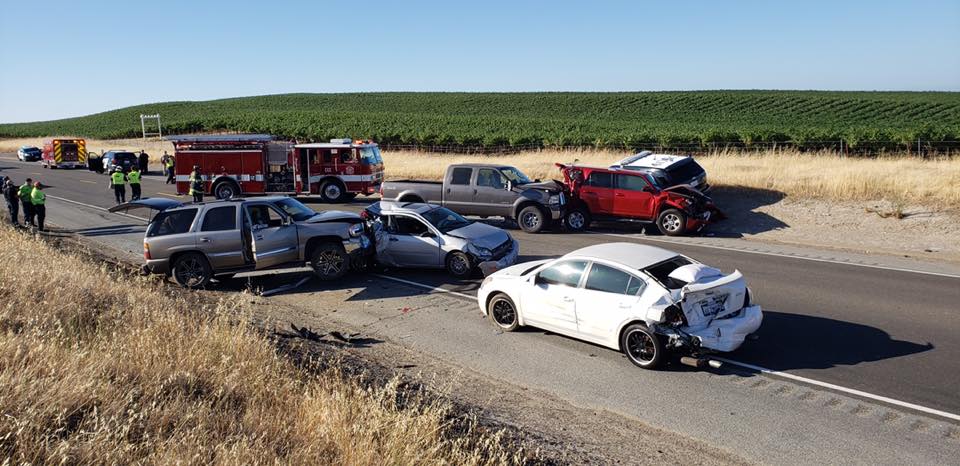
Six-car accident on Vasco Road, Friday evening, July 19, 2019. Photos by East Contra Costa Fire Protection District.
Friday evening at about 5:32 P.M., Contra Costa CHP was advised of a six-vehicle collision on Vasco Road, just north of Camino Diablo in east Contra Costa County. An on-duty Contra Costa Sheriff’s deputy was involved but thankfully only sustained minor injuries.
Three parties from the collision were transported to local hospital’s by CHP helicopter, Contra Costa Sheriff’s office Cal-Star helicopter, and Reach regional helicopter as well. Three other parties were transported to local hospitals by ground ambulance. Thankfully all injured parties sustained non-life-threatening injuries. We’d like to thank our allied agencies and emergency personnel on scene for their help in this incident.
The cause of the collision is still under investigation. Alcohol and/or drug impairment is not suspected. If anyone has information about this collision, please call the Contra Costa CHP Office at 925-646-4980. Thank you and please drive safe.
Read More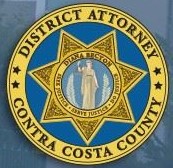 By Scott Alonso, Public Information Officer, Contra Costa District Attorney
By Scott Alonso, Public Information Officer, Contra Costa District Attorney
On Monday July 15, 2019, defendants Cornelius Salmer, Antoinette Green, Benisha Seldon, and Jonnie Gilbert pleaded guilty to insurance fraud for their roles in an organized fraud ring. The defendants submitted fraudulent auto insurance claims in excess of $100,000 to insurance companies using multiple vehicles and stolen identities.
Salmer pleaded no contest to six felonies, including three counts of filing a false insurance claim in violation of Penal Code section 550(a)(1) and three felony counts of identity theft in violation of Penal Code section 530.5. Contra Costa County Superior Court Judge David Goldstein sentenced him to three years in prison and ordered him to pay $63,217.26 of restitution pursuant to the terms of the plea.
Seldon and Green each pleaded no contest to two felonies for filing a false insurance claim in violation of Penal Code section 550(a)(1) and identity theft in violation of Penal Code section 530.5. Judge Goldstein sentenced Seldon to three years of formal probation and 180 days of jail and ordered her to pay $32,597.02 restitution pursuant to the plea terms. Judge Goldstein also sentenced Green to three years of formal probation and 180 days of jail and ordered her to pay $19,414.17 restitution.
Gilbert pleaded no contest to a single count of receiving stolen property as a misdemeanor and received a sentence of two years’ probation, 30 days jail, and $2,450.52 of restitution pursuant to the terms of the plea agreement.
The case originated with a referral from the analysts at the National Insurance Crime Bureau that triggered a joint investigation by the California Department of Insurance, the California Highway Patrol, and the Contra Costa County District Attorney’s Office. Investigators linked multiple insurance claims to the defendants and identified a corridor of suspected mail theft along the Interstate 5 freeway by locating and interviewing the identity theft victims. The investigators traced the money from the fraudulent claims to identify and arrest the charged defendants for this fraud conspiracy.
Deputy District Attorney Greg Chiarella prosecuted the case. DDA Chiarella is assigned to our Auto Insurance Fraud Unit.
The District Attorney’s fraud units investigate and prosecute all forms of insurance fraud, including false claims activity, organized fraud rings, health care provider fraud and kickback schemes, industry insider fraud, and employer premium fraud. You can report suspected insurance fraud by email to DA-ReportFraud@contracostada.org.
Read MoreBy Tim Leong, Director, Communications and Community Relations, CCCCD
Contra Costa Community College District (District) chancellor Fred Wood announced he plans to retire on March 31, 2020. Since joining the District in 2017, Wood is credited with bringing stability to the District during a time of enrollment challenges and significant changes in the funding formula for California community colleges.
“After considerable and thoughtful deliberations, I have decided to retire after a
four-decade career in higher education due to increased personal obligations and because I firmly believe the District is ready for new leadership”, said Wood. “Although there is never a perfect time for a leadership transition, the District is in a great place with a very strong financial position, stabilized enrollment, and doing a tremendous job of serving our students and community.”
The chancellor also cited other reasons the District is ready for new leadership by acknowledging the colleges are fully engaged and preparing for upcoming accreditation visits, the migration to a new format for district policies is underway, the capital construction bond program is moving along well, stronger relationships are being developed with educational and community partners, and the Governing Board has just approved a new District five-year strategic plan.
“We have been extremely fortunate to have Fred’s leadership over the past few years”, said Governing Board President Vicki Gordon. “His honesty, integrity, thoughtful leadership, and passion for students were exactly what the District needed during this time. We will miss his leadership and he will be a hard act to follow.”
The Governing Board will begin discussing how they will recruit the next chancellor at their upcoming meetings. The plan is to complete the selection before Wood’s retirement to ensure a smooth transition.
Wood grew up in Martinez, attended Diablo Valley College as a first-generation college graduate, and credits the community college experience for transforming his life. He is grateful for the opportunity to come “back home” and contribute to the District’s legacy of making a difference in the lives of its students.
“What I am most proud of during my tenure is the opportunity to join our Governing Board, faculty, staff, and community leaders in their work to support our students,” said Wood. “They deserve the recognition for the success of our District and our three excellent colleges.”
The Contra Costa Community College District (CCCCD) is one of the largest multi-college community college districts in California. The CCCCD serves a population of 1,019,640 people, and its boundaries encompass all but 48 of the 734-square-mile land area of Contra Costa County. The District is home to Contra Costa College in San Pablo, Diablo Valley College in Pleasant Hill, Los Medanos College in Pittsburg, as well as educational centers in Brentwood and San Ramon. The District headquarters is located in downtown Martinez.
Read MoreBy Hercules Police Department
On June 24, 2019, at approximately 1:05 pm, an Officer attempted to stop a red, 2015, Nissan Altima, on San Pablo Avenue near Sycamore Avenue for speeding. The vehicle did not yield for the officer’s emergency lights and turned east onto Sycamore Avenue. The vehicle started to cut in and out of traffic while still ignoring the Officers emergency lights. The vehicle drove through a red traffic light and then continued to weave in and out of traffic east bound on Sycamore Avenue. The vehicle finally yielded in the Rite Aid Parking lot near the Turquoise Drive entrance.
The driver, 53-year-old Stephen McDonald from Hercules, was detained. McDonald displayed objective signs of being intoxicated. McDonald was placed under arrest for Evading the Police and DUI and ultimately transported to jail.
From post on Hercules PD Facebook page on Wed., July 17, 2019.
Read MoreInvestigation started by FBI Safe Streets Task Force
By Scott Alonso, Public Information Officer, Contra Costa District Attorney
On Wednesday, July 17, 2019, 34-year-old Richmond resident Mychal Duane Nelson was charged by the Contra Costa County District Attorney’s Office in a felony complaint alleging violations of sex trafficking a minor, pandering a minor, using a minor for sex acts, showing pornography to a minor, contact with a minor for a sex offense and pandering, with allegations that he suffered prior “three strikes” convictions.
In a separate case, Nelson has also been charged with the residential burglary of an apartment in Hercules where losses exceeded $20,000. Nelson is a known associate with a North Richmond Street Gang and has prior arrests for violent crimes. He is currently on State Parole.
The sex trafficking investigation started with the Federal Bureau of Investigation/Contra Costa County Safe Streets Task Force and the Contra Costa County District Attorney’s Human Trafficking Unit. The investigation showed that Nelson was using social media and other forms of communication to actively recruit a 16-year-old girl and encourage her to engage in prostitution. As part of this process, Nelson sent the girl sexually explicit videos and images of himself and requested that she do the same.
During the sex trafficking investigation, Nelson was tracked throughout Northern and Southern California with the assistance of multiple law enforcement agencies, including the Los Angeles County Human Trafficking Task Force, the Richmond Police Department, the Vallejo Police Department and several federal law enforcement agencies. He was ultimately arrested on July 13 in Hayward by the Contra Costa District Attorney’s Office and booked into the Martinez Detention Facility.
Social media platforms are frequently used to identify and recruit minors into the commercial sex industry. If you or someone you know are being pressured or encouraged to engage in prostitution to benefit or help support another person, help is only a phone call away. Contact Community Violence Solutions at 800-670-7273 to speak to a confidential counselor. Or visit the Contra Costa Family Justice Centers in Richmond or Concord to talk to a Navigator about a variety of services and support available right here in Contra Costa County. The Family Justice Centers are a family-friendly one-stop center serving victims of human trafficking, domestic violence and other types of interpersonal violence. No appointment is needed, and the centers are located at 256 24th Street in Richmond, 2151 Salvio St., Suite. 201 in Concord or 3501 Lone Tree Way in Antioch. To learn more about human trafficking in Contra Costa County, visit the Contra Costa Human Trafficking Coalition’s webpage at www.contracostacoalition.org.
Nelson has two pages on Facebook. The first page has his name spelled correctly and showing him living in Richmond. The other has his name misspelled Mychael Nelson and living in Antioch.
Anyone with information about this case is asked to contact Contra Costa County District Attorney’s Office Senior Inspector Kevin Coelho at 925-957-8629.
UPDATE: According to Alonso, “there might be additional victims.”
Case Information: People v. Mychal Nelson 01-190646-0; People v. Mychal Nelson 02-330323-7
Allen Payton contributed to this report.
Read MoreThe Hazel-Atlas Mine and Greathouse Visitor Center will be closed until September 10 while a new exhibit is installed. No mine tours will be available during the construction period. Sidney Flat Visitor Center, located at park headquarters, will be open on weekends during the summer from 10 a.m. to 4:30 p.m.
The new Black Diamond Coal Mine exhibit, built into the existing Hazel-Atlas silica sand mine, will be an immersive experience taking visitors into a recreated 1870s coal mine, part of California’s largest coal mining operation. All of the original coal mines at the preserve have been closed to the public and permanently sealed for public safety. Visitors to the new exhibit will experience the sights and sounds of a working coal mine from nearly 150 years ago when immigrant miners worked deep in the earth to supply California with the energy needed to power and transform the state’s economy from rural to industrial. The new exhibit is scheduled to open to the public in the spring.
Black Diamond Mines Naturalist Eddie Willis is looking forward to the new addition to the Hazel-Atlas Mine and Greathouse Visitor Center. “We are excited to showcase this new exhibit which will allow visitors to connect more directly with the coal mining legacy of these hills in a safe and educational way,” said Willis.
To help fund the visitor center exhibit, the Regional Parks Foundation secured two grants from the Wayne and Gladys Valley Foundation and Marathon Petroleum.
Read More
By Jimmy Lee, Director of Public Affairs, Contra Costa County Office of the Sheriff
The Contra Costa County Office of the Sheriff and the Contra Costa D.A.’s Office recently received information about a person who was allegedly possessing and sharing child pornography. Detectives launched an investigation and on July 3, 2019, executed search warrants at residences in Danville and Dublin.
Detectives subsequently found child pornography on electronic devices belonging to 18-year-old James Happ of Dublin. He was booked at the Martinez Detention Facility for possession of child pornography. Happ was being held in lieu of $100,000 bail and has since bailed out.
Additionally, as Happ is a swim instructor at The Wave in Dublin, the Dublin Police Department is conducting a separate investigation. Any inquiries regarding The Wave can be directed to the Dublin Police Department.
Anyone with any information on this case is asked to contact the Office of the Sheriff Investigation Division at (925) 313-2600. For any tips, email: tips@so.cccounty.us or call (866) 846-3592 to leave an anonymous voice message.
Read More





